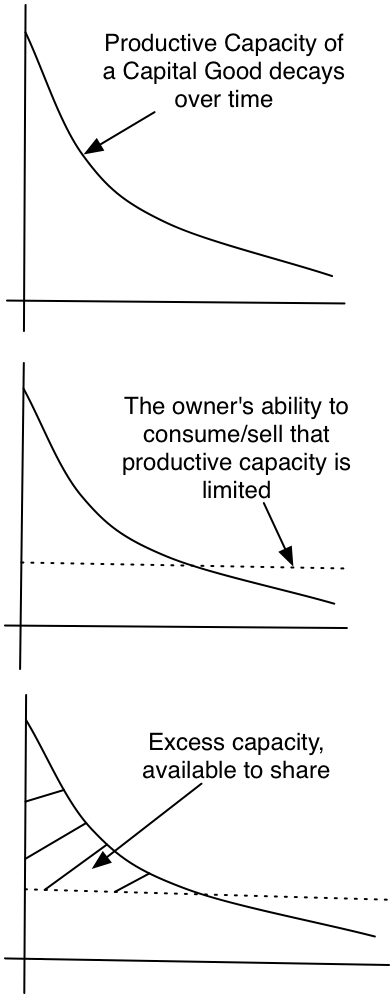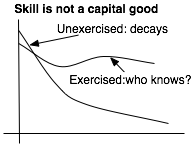I hate most explanations for why people participate in Open Source. I care about this question. I enjoy the game of puzzling out the answer. In a reversal of the usual cliche I love the game and hate the players; the casual players who think they know the answer. After two decades of thinking about this question I love that I stumble upon new answers.
 This morning I was attempting to read, yet again, Benkler’s essay on sharing nicely where in he argues that the usual dialectic framing of how to coordinate activities (hierarchy v.s. markets) has blinded us to a third scheme; i.e. sharing. He points out some huge coordination problems that are solved via sharing and he does the good and necessary work of constructing an economic model for why some problems are well solved by sharing.
This morning I was attempting to read, yet again, Benkler’s essay on sharing nicely where in he argues that the usual dialectic framing of how to coordinate activities (hierarchy v.s. markets) has blinded us to a third scheme; i.e. sharing. He points out some huge coordination problems that are solved via sharing and he does the good and necessary work of constructing an economic model for why some problems are well solved by sharing.
Part of his model explains why owners have excess lying around, that is suitable for sharing. In that explanation I was excited to to notice a new motivation for sharing.
Benkler draws our attention to excess capacity that owners can not consume. Idle cycles on your PC or empty seats in your car as you drive hither and yon. He model for this is analogous to that seen in value pricing models – i.e. if you own a hotel full of rooms and as the hour grows late you should consider selling those rooms for less; since otherwise they will go idle an you will get nothing.
I found my self thinking at that point about the emotions an owner has about this excess capacity, for example the sense of of lost opportunity, leading to emotions of frustration, grief, guilt. The hostess pressing left overs on her guests as the party wraps up is motivated by a horror at the waste shows how motivating this kind of sharing might be.
But the resource that drives open source is talent so the question naturally arises at this point does this model have something to say about sharing around the creation of these knowledge pools? This is delightful bit. If we think of skill as a capital good then talented people own building full of skills; and they lease out to earn their living. Of course most of the time they can’t find a buyer for all their skills. The rooms are empty. It’s not surprising that they are willing to share freely some of this capacity.
 I had already noted many of the motivations outlined above for sharing one’s talents: countering the guilt for letting it go to waste, the positive emotions of generosity, the low cost of giving away the excess capacity. But I had not noticed something else: skills that are not exercised decay. While the hotel room left idle depreciates only slightly, a skill unused decays quickly. The skill demands that I exercise it, it’s survival depends on that exercise. If I horde it, it evaporates.
I had already noted many of the motivations outlined above for sharing one’s talents: countering the guilt for letting it go to waste, the positive emotions of generosity, the low cost of giving away the excess capacity. But I had not noticed something else: skills that are not exercised decay. While the hotel room left idle depreciates only slightly, a skill unused decays quickly. The skill demands that I exercise it, it’s survival depends on that exercise. If I horde it, it evaporates.